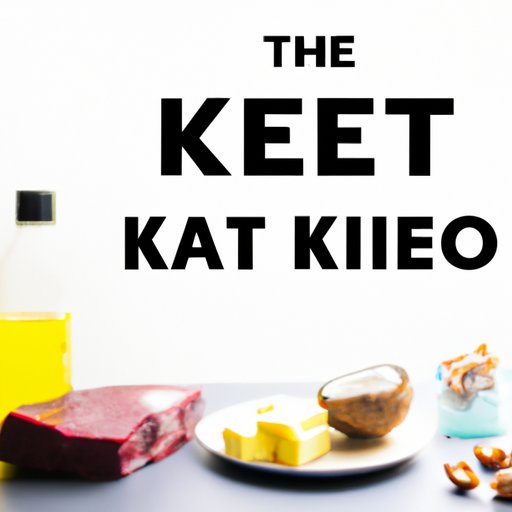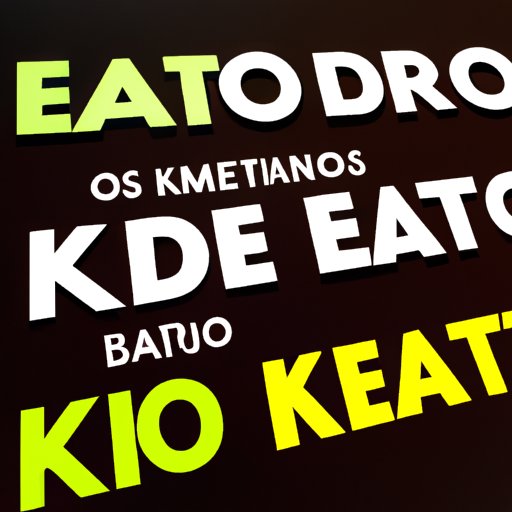Introduction
The ketogenic diet is an increasingly popular eating plan that focuses on high-fat and low-carbohydrate foods. It has been shown to be effective for weight loss, as well as reducing risk factors for certain chronic diseases. However, it’s important to understand which types of fats are healthy to eat on a keto diet, and how to choose the right ones for optimal results.
A Comprehensive Guide to Healthy Fats on the Keto Diet
When it comes to eating fat on a keto diet, it’s important to know the difference between the three main types of fats: monounsaturated, polyunsaturated, and saturated. Here’s a quick overview of each type of fat:
- Monounsaturated Fats: These are found in foods like avocados, olives, nuts, and seeds. Monounsaturated fats are considered “good” fats because they can help reduce cholesterol levels and improve heart health.
- Polyunsaturated Fats: These are found in fatty fish, sunflower oil, flaxseed oil, and walnuts. Polyunsaturated fats are also considered “good” fats because they can help reduce inflammation and boost brain health.
- Saturated Fats: These are found in animal products such as butter, cheese, and red meat. Saturated fats are not necessarily bad for you, but they should be eaten in moderation.

Exploring the Benefits of Consuming Different Types of Fat on a Keto Diet
Now that you have a basic understanding of the different types of fats, let’s take a closer look at the benefits of consuming each type of fat on a keto diet.
Benefits of Monounsaturated Fats
Monounsaturated fats are a great source of energy on a keto diet, and they can also help reduce cholesterol levels and improve heart health. Eating these fats in moderation can also help reduce inflammation and support healthy brain function.
Benefits of Polyunsaturated Fats
Polyunsaturated fats are an excellent source of omega-3 fatty acids, which can help reduce inflammation and boost brain health. They can also help lower your risk of heart disease and stroke, and support healthy blood sugar levels.
Benefits of Saturated Fats
Saturated fats are an important source of energy on a keto diet, and they can help support healthy hormone production. They can also help improve skin health and provide essential nutrients for the body.

Eating the Right Fats on Keto: Essential Tips for Optimal Results
If you want to get the most out of your keto diet, it’s important to make sure you’re eating the right types of fats in the right amounts. Here are some essential tips to keep in mind when it comes to consuming fats on a keto diet:
- Monitor Your Fat Intake: It’s important to pay attention to how much fat you’re eating on a daily basis. Aim for 20-30% of your daily calories to come from fat, depending on your individual needs.
- Choose the Right Sources of Fats: Not all fats are created equal. Choose sources of healthy fats, such as nuts, seeds, avocado, and olive oil, rather than processed foods or trans fats.
- Balance Your Macronutrient Intake: To ensure you’re getting enough protein and carbohydrates while on a keto diet, make sure to balance your fat intake with adequate amounts of protein and carbs.
The Best Fats to Include in Your Keto Meal Plan
When it comes to choosing the right fats for a successful keto diet, there are a few options to consider. Here are some of the best sources of healthy fats to include in your keto meal plan:
- Nuts and Seeds: Nuts and seeds are full of healthy fats, fiber, and other important nutrients. Almonds, walnuts, chia seeds, and hemp seeds are all great options.
- Avocado and Olives: Avocado and olives are both high in monounsaturated fats, which can help reduce cholesterol levels and improve heart health.
- Coconut Oil and Ghee: Coconut oil and ghee (clarified butter) are both great sources of healthy saturated fats that can help support healthy hormone production.
- Animal Fats: Animal fats can be a great source of energy on a keto diet. Look for grass-fed beef, wild-caught fish, and pasture-raised eggs for the most nutrient-dense sources.
- Nut Butter: Nut butters are a great way to add healthy fats to your meals without adding too many calories. Look for nut butters made from almonds, cashews, or peanuts.

How to Choose the Right Fats for a Successful Keto Diet
When it comes to choosing the right fats for your keto diet, it’s important to read food labels carefully and be aware of any added sugars or unhealthy ingredients. Here are some other essential tips to keep in mind:
- Read Food Labels Carefully: Always read food labels carefully to make sure you’re getting healthy fats from natural sources. Avoid processed foods and opt for whole foods whenever possible.
- Avoid Trans Fats: Trans fats should be avoided at all costs. Look for foods labeled “trans fat-free” or “hydrogenated oil-free” to make sure you’re avoiding these unhealthy fats.
- Be Wary of Processed Foods: Processed foods often contain unhealthy ingredients, so it’s best to avoid them as much as possible. Stick to whole, unprocessed foods whenever possible.
Conclusion
In conclusion, it’s important to understand which types of fats are healthy to eat on a keto diet. Monounsaturated, polyunsaturated, and saturated fats are all important sources of energy and essential nutrients. Eating the right types of fats in the right amounts is key to achieving optimal results on a keto diet. By following the tips outlined above, you’ll be well on your way to a successful keto diet.
(Note: Is this article not meeting your expectations? Do you have knowledge or insights to share? Unlock new opportunities and expand your reach by joining our authors team. Click Registration to join us and share your expertise with our readers.)
